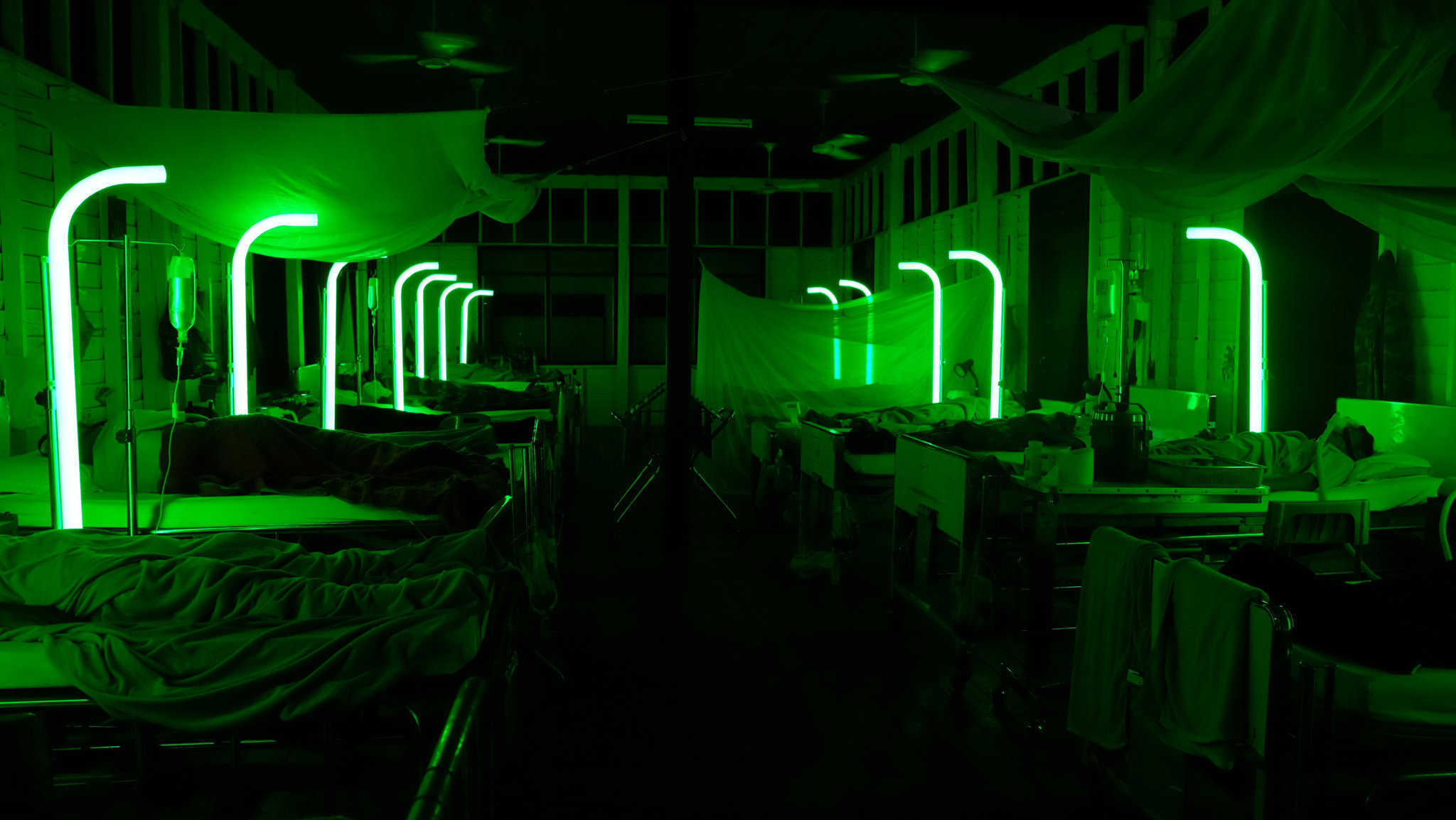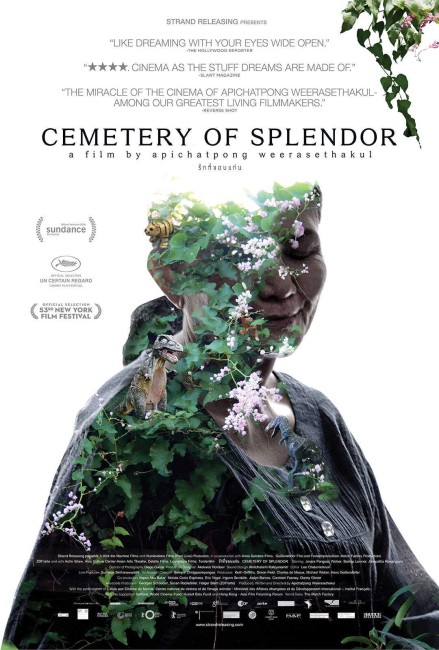(Rak Ti Khon Kaen)
Thailand/UK/France/Germany. 2015.
Crew
Director/Screenplay – Apichatpong Weerasethakul, Producers – Charles de Meaux, Simon Field, Hans Geissendoerfer, Keith Griffiths, Michael Weber & Apichatpong Weerasethakul, Photography – Diego Garcia, Production Design – Akekarat Homlaor. Production Company – Kick the Machine Films/Illuminations Films (Past Lives)/Anna Sanders Films/Geissendoerfer Film und Fernsehproduktion/Match Factory Productions/ZDF/Arte and Astro Shaw/Asia Culture Center-Asian Arts Theatre/Detaille Films/Louverture Films/Tordenfilm/L’Aide aux Cinema du Monde/Centre National du Cinema et de l’Image Animee – Ministere des Affaires Etrangeres et du Development International – Institute Francais/Sorfond/World Cinema Fund/The Hubert Bals Fund/Hong Kong – Asia Film Financing Forum.
Cast
Jenjira Pongpas Widner (Jen), Banlop Lomnoi (Itt), Jarinpattra Ruenagram (Keng), Petcharat Chaiburi (Nurse Tet), Sujittraporn Wongsrikeaw (Goddess 1), Bhattaratorn Senkraigul (Goddess 2)
Plot
Jen, a middle-aged woman who has one leg shorter than the other and limps with a cane, becomes a volunteer as a care aid at a hospital that has been set up for soldiers suffering from a sleeping sickness. She befriends Keng, a fellow volunteer who has the psychic ability to read people’s past lives. Jen also befriends Itt, one of the sleeping soldiers, after he wakes up. When Jen makes a sacrifice at a local temple, two goddesses appear to her and explain that the soldiers are suffering because the hospital lies buried on the cemetery of long-dead kings and that their souls have been conscripted to continue fighting their endless war.
I have to say that, critical darling and all that he has become, I am not one of the cheerleaders for Apichatpong Weerasethakul. Weerasethakul is a Thai director who has made films such as Blissfully Yours (2002), Syndromes and a Century (2006) and especially Uncle Boonmee Who Can Recall His Past Lives (2010), which won the Palme d’Or at Cannes. Beginning with Tropical Malady (2004), in which one of the stories featured a ghost tiger, Weerasethakul began to venture into fantastical material and has remained there ever since with the likes of Uncle Boonmee, Mekong Hotel (2012), Cemetery of Splendor and Memoria (2021).
Apichatpong Weerasethakul’s films come steeped in the local beliefs and myths of the supernatural where spirits of the dead walk among the living and it seems perfectly normal to talk about one’s past lives. Weerasethakul’s films attract descriptions like serene, placid and tranquil (which on the other side of the critical coin you could point out also equals dull, inert and static). I do like the intensely haunted atmosphere that Weerasethakul generates. You suspect that if he were to ever work for the US mainstream and adopt far more commercial strictures, Weerasethakul could have the makings of a cult director.
Alas, Weerasethakul’s films, at least when viewing them from a genre perspective, seem almost completely at odds with anything like genre-identifying storytelling. Where ghost stories come with standard plot arcs, Weerasethakul’s films feel filled with scenes that sit at oblique angles to one another and do not intersect in any discernible way. They are less like watching dramatic films than one of the tv channels that flip between cameras that sit observing random street scenes around the world for several minutes at a time. They never seem to ever coalesce into something that resembles a plot as we traditionally know it – a perfect example here is the character who is said to have the intriguing ability to read people’s past lives but then after being introduced, as you might expect in a standard script, proves to be of no further relevance to the rest of the story.

Cemetery of Splendor is Apichatpong Weerasethakul as usual. A large part of the film consists of nothing much at all happening as we watch Jenjira Pongpas Widner taking a job and going about tending the patients at the hospital, eating her lunch, going to the market, sitting beside the river and so on. That said, about one hour in, Weerasethakul gives us a scene that jolts us out of our lethargy (or tranquillity) and make us sit up in attention. One of these is where Jenjira Pongpas Widner is sitting down to eat and is joined by two beautiful girls who after some minor casual chat abruptly claim to be deities who come from the temple where she left toy animals as an offering (which one gathers is a practice in Thailand) and explain to her that those at the hospital will never wake up because the hospital has been built on the burial site of kings and that their souls have been conscripted to fight a war that extends into the afterlife.
Now, you suspect that an American genre film could have gone on to built an extraordinary epic out of such an idea but Weerasethakul never moves out of his tranquilly slow pace in any way and just returns to the same uneventful happenings as before. We watch Jenjira Pongpas Widner as she befriends the younger, flirtatious Itt (Banlop Lomnoi) who may or may not be the same comatose patient she is tending – there never seems to be any scene where we see him wake up.
The most unusual scene is the strangely perverse one when someone else also referred to as Itt, who appears to be a spirit, comes to Jenjira and insists on seeing her damaged leg and then kneels and licks the wound. The film proceeds on with more not much of anything happening before reaching an irresolute ending. There is a peculiarly surreal and unconnected final image where a giant amoeba appears in the sky.
This is the frustration of an Apichatpong Weerasethakul film – moments of the intensely haunted and/or weird, followed by scenes that continue as though none of this has happened and never the sense that the plot or the characters in one of his films are going from one place to the next in any dramatic way.
Trailer here

